As the glorious summer draws to a damp close, Wales Arts Review’s top writers reflect on the books that have made their mark these last few months, from classics, to curios, from bestsellers to surprises.
Craig Austin
Roxy Music – Style with Substance: Roxy’s First Ten Years
by Johnny Rogan
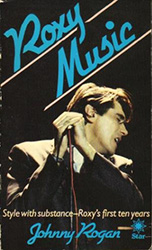 As literary investments go, the solitary pound coin that I recently passed over the counter of my local charity shop in exchange for a yellowed, yet precious, early ‘80s time capsule of eternal pop cultural ambition will surely take some beating. Emanating the evocative aroma of stale untipped cigarettes, and numerous ill-tempered divorces, Roxy Music – Style with Substance, Roxy’s First Ten Years, embodies the thrillingly lawless period of British pop music’s golden age, and the opportunistically scurrilous cottage industry of flimsy, rush-released biographies that followed in its wake. Its author, Johnny Rogan, ultimately went on to become the definitive biographer of The Smiths – albeit one upon whom Morrissey would wish death ‘in an M3 pile-up’. Yet his weighty and authoritatively researched tome, Morrissey and Marr – The Severed Alliance, sits in stark contrast to this particular gem, its flashy, trashy, (and less conventionally handsome) younger brother. In a little over two hundred of its tiny, cheaply printed pages it (successfully) sets out to make an insurmountable case for a ruthless teenage prosecution of Sir Bryan of Ferry, on grounds of shameless artistic treachery, a decade-spanning progression/regression from an unwieldy cabal of archly glamorous pop pioneers to the smugly pedestrian pedlars of formulaic yuppie gruel. A ten-year period that saw the band mutate from an unsettlingly and unconventionally thrilling creative proposition to the sulky awkward looking bit-players of Bryan Ferry’s default backing band, the one-time sound-trackers of a stardust-speckled alien invasion, reduced to a life as the impotent background entertainment of Knightsbridge dinner parties.
As literary investments go, the solitary pound coin that I recently passed over the counter of my local charity shop in exchange for a yellowed, yet precious, early ‘80s time capsule of eternal pop cultural ambition will surely take some beating. Emanating the evocative aroma of stale untipped cigarettes, and numerous ill-tempered divorces, Roxy Music – Style with Substance, Roxy’s First Ten Years, embodies the thrillingly lawless period of British pop music’s golden age, and the opportunistically scurrilous cottage industry of flimsy, rush-released biographies that followed in its wake. Its author, Johnny Rogan, ultimately went on to become the definitive biographer of The Smiths – albeit one upon whom Morrissey would wish death ‘in an M3 pile-up’. Yet his weighty and authoritatively researched tome, Morrissey and Marr – The Severed Alliance, sits in stark contrast to this particular gem, its flashy, trashy, (and less conventionally handsome) younger brother. In a little over two hundred of its tiny, cheaply printed pages it (successfully) sets out to make an insurmountable case for a ruthless teenage prosecution of Sir Bryan of Ferry, on grounds of shameless artistic treachery, a decade-spanning progression/regression from an unwieldy cabal of archly glamorous pop pioneers to the smugly pedestrian pedlars of formulaic yuppie gruel. A ten-year period that saw the band mutate from an unsettlingly and unconventionally thrilling creative proposition to the sulky awkward looking bit-players of Bryan Ferry’s default backing band, the one-time sound-trackers of a stardust-speckled alien invasion, reduced to a life as the impotent background entertainment of Knightsbridge dinner parties.
Though we now live in an age that has effectively removed any element of mystery, mystique, or artifice from the canvas of pop culture, it’s all the more ironic that its primary players appear to have become all the more guarded and paranoid. Conversely, Rogan’s book gives its reader a deliciously unrestricted ‘of its time’ insight into the unlegislated backstage shenanigans of one-time pop royalty. Aside from Rogan’s stomach-churning reference to Ferry’s ‘love-making’ being ‘stimulating and refreshing’, the light that is shone upon the bizarre sexual athleticism of the band’s balding, peacock-feathered fulcrum, Brian Eno, is truly something to behold. In one particularly outlandish passage Rogan details a legendary bout of carnal excess, the bizarre content of which has been rattling around my head for most of the Summer: ‘On one occasion, the frail one pushed his body to the edge of physical endurance by taking on six girls in a thirty-hour session. It was these type of excesses that would later result in a collapsed lung’. That’s right, dear reader, a collapsed lung. Ultimately, the time that I have invested in the reading this scandalous pocket-rocket of a book has taught me little that I didn’t already know about Roxy Music, other than the fact that Brian Eno has probably spent the lengthy period of his life from 1973 onwards needing to have a bit of a lie down. Please excuse me for a moment, there’s a book that I need to list on eBay.
Adam Somerset
National Service
by Richard Eyre
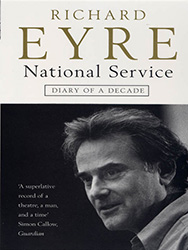 A part of my city pattern, three or four times a year, is to stop by the Oxfam bookshop en route to Cardiff Central. Currently relocated to the handsome Royal Arcade it always yields something of interest. In the summer of 2013 it turned out to be Richard Eyre’s record of ten years’ love and labour at the helm of London’s Royal National Theatre. A diary form allows a readerly dipping in and out, and it was my cheering literary accompaniment over six weeks of the sunniest days of summer.
A part of my city pattern, three or four times a year, is to stop by the Oxfam bookshop en route to Cardiff Central. Currently relocated to the handsome Royal Arcade it always yields something of interest. In the summer of 2013 it turned out to be Richard Eyre’s record of ten years’ love and labour at the helm of London’s Royal National Theatre. A diary form allows a readerly dipping in and out, and it was my cheering literary accompaniment over six weeks of the sunniest days of summer.
A memoir of productions and events from two decades back could well be specialist material. National Service is elevated on three counts. Firstly, it is edited. The diaries run from 17th January 1987 to 1st October 1997 by which time the author has become ‘Sir Richard.’ Even at four hundred pages that means the editorial knife has been applied. The items and observations that remain are of unfailing interest.
Secondly, Sir Richard is a writer. Had he not had a marked talent for theatre he could have been a full-time writer. His January 11th 1994 entry reads, ‘I feel caught between needing balm in order to assuage pain and providing the pain in order to apply the balm. I’m a Catholic in everything but religion – I believe in guilt, suffering as the cost of happiness, failure as the cost of success. It’s a Newtonian emotional universe – action and re-action are equal and opposite.’
Thirdly, a diarist is a particular kind of literary companion. His is not a memoir in which a case need be argued, a reputation defended or a policy justified. He is a confidante, in which the private persona goes hand in hand with the high-visibility public role. The editing does not exclude the sorrow in the face of afflicted, aging parents or the sense of loss at a familiar home whose garden is filled with new building. 5th August 1996 a powerful curry too soon after a haemorrhoidectomy has an agonising effect. 12th January 1994 he is reaching for that first blister pack of Prozac.
Eyre is a man of the theatre but whose interests are extensive. There are tales from show business – a deeply drunk Martin McDonagh is wildly insulting to Sean Connery – but these scenes live alongside words from philosophers and poets. He reads that great poet of the Dundee northern light Douglas Dunn ‘Only a garden can teach gardening’. And ‘only a theatre can teach theatre’ Eyre observes ‘and only directing a play can teach you how to direct a play.’
The great weight of the National bears down on its custodian. He has a permanent eagle eye on the box office, he assesses the critics, is distracted by a thousand other issues from the main thing. 23rd April 1994 he is feeling ‘oppressed by the building, the administration, the expectations, and I find it so difficult to concentrate upon the work.’ He may write 27th May 1996 ‘I feel that I’m regarded as the curator of a museum of ancient crafts’ but he ends his Introduction to the book with the heart of it: ‘I found out that to work at something you feel is worth doing, in the company of people for whom you feel admiration and affection, for the benefit of people who endorse what you do, is just about as good as life gets.’
He’s right. It is as good as it gets.
Angela Graham
Red Carpets and Other Banana Skins
by Rupert Everett
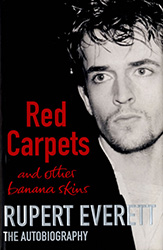 To be extreme about it, to visit the village of Bushmills in County Antrim is to encounter a strange blend of the puritan and the self-indulgent. Home to the famous whiskey distillery, its main street is a shrine to the virtues of sober self-control and dogged frontier spirit:banners on every lamp-post display earnestly venturesome Sons of Ulster who have tamed the Wild West or, in the case of that well-known Ulster Scot, Neil Armstrong, crossed ‘the final frontier’ and walked on the moon. Who was it, I wonder, who donated to the charity stall in the local Co-op a copy of Rupert Everett’s first volume of auto-biography, Red Carpets and Other Banana Skins? A closet luvvie, perhaps?
To be extreme about it, to visit the village of Bushmills in County Antrim is to encounter a strange blend of the puritan and the self-indulgent. Home to the famous whiskey distillery, its main street is a shrine to the virtues of sober self-control and dogged frontier spirit:banners on every lamp-post display earnestly venturesome Sons of Ulster who have tamed the Wild West or, in the case of that well-known Ulster Scot, Neil Armstrong, crossed ‘the final frontier’ and walked on the moon. Who was it, I wonder, who donated to the charity stall in the local Co-op a copy of Rupert Everett’s first volume of auto-biography, Red Carpets and Other Banana Skins? A closet luvvie, perhaps?
Whoever you are, I’m very grateful. I’d always meant to read this since seeing positive reviews when it first came out. It is tremendously entertaining. His first experience of film, Mary Poppins, was enough to reveal to him his vocation: ‘a giant and deranged ego had been born.’ He was ‘looking for a new personality’ and acting was the natural outcome, but he is a skilful writer too and the tone of the book is wonderfully judged.The reader lives vicariously a riot of outrageous situations as this self-styled ‘monster’ careers amongst relationships and celebrities, but the mixture of destructiveness and tenderness is so acutely rendered that one accepts him on his own terms. His account of his upper class English Catholic roots rings very true. Just as he has done something appalling, in terms of that particular code, we find him stating simply where he has been attending Mass for the past few weeks. He completely lacks cant.
I look forward to reading the next volume of autobiography, Vanished Years, which came out last year.
Gary Raymond
Tormented Hope: Nine Hypochondriac Lives
by Brian Dillon
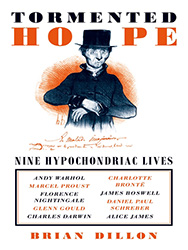 I was sitting in a crisply lit living room, and I was telling the writer Laura Wainwright that I’d recently caught a glimpse of myself at work. It was a recent photograph, and I had been oblivious to its taking. I was at my desk battering away at the computer, probably on something I ended up discarding. I had not been able to get the image off my mind, because my pose had reminded me so perfectly of the crunched kneaded figure of Glenn Gould at the piano. I too did my work at the keys from an old chair that forced me into an ergonomic gargoyle. My fingers, like talons, clawed at the keyboard. Laura laughed and, bidding me to hold that thought, she left the room. When she returned she handed me a copy of Tormented Hope: Nine Hypochondriac Lives by Brian Dillon. ‘Gould is chapter six,’ she said. ‘You can have that.’ I read the book the following day. It is the type of book that qualifies publishing as one of the art forms. It is not only a desirable item, and one with a good sense of humour, but the subject matter is the product of Dillon’s off-centre outlook, and it looks out onto minds that were also of a different ilk. The subject matter is pocket dust in the grand parade of human endeavour, and the neuroses of the figures explored are dwarfed by their intellectual achievements, but it is enthralling, dramatic and at times warmly funny.
I was sitting in a crisply lit living room, and I was telling the writer Laura Wainwright that I’d recently caught a glimpse of myself at work. It was a recent photograph, and I had been oblivious to its taking. I was at my desk battering away at the computer, probably on something I ended up discarding. I had not been able to get the image off my mind, because my pose had reminded me so perfectly of the crunched kneaded figure of Glenn Gould at the piano. I too did my work at the keys from an old chair that forced me into an ergonomic gargoyle. My fingers, like talons, clawed at the keyboard. Laura laughed and, bidding me to hold that thought, she left the room. When she returned she handed me a copy of Tormented Hope: Nine Hypochondriac Lives by Brian Dillon. ‘Gould is chapter six,’ she said. ‘You can have that.’ I read the book the following day. It is the type of book that qualifies publishing as one of the art forms. It is not only a desirable item, and one with a good sense of humour, but the subject matter is the product of Dillon’s off-centre outlook, and it looks out onto minds that were also of a different ilk. The subject matter is pocket dust in the grand parade of human endeavour, and the neuroses of the figures explored are dwarfed by their intellectual achievements, but it is enthralling, dramatic and at times warmly funny.
Aside from Gould (a figure who has long fascinated me) we are introduced to lesser-known sides of James Boswell, Proust, Florence Nightingale, Darwin, Charlotte Bronte, Warhol, Daniel Paul Schreber and Alice James. Each of them figures of intriguing, not to say tragic, stories. Dillon is a sharp and astute essayist, and although it may be easy to look at the delusions of people like Schreber (who believed he had been sent to earth by God to give birth to a new race of men, and so was slowly transforming into a woman) with a comic book detachment, he does manage to bring the reader closer to the skin of the subject. Mental illness is no longer a fecund hunting ground for serious populists (or serious comedians), and Dillon manages to be conscientious about his subjects’ maladies whilst also not shying away from the tragic absurdity of their sad predicaments. And there is the wider, more profound picture. That Alice James’ heart-breaking story of a life with chronic neurasthenia (a condition now most likely to be diagnosed as depression) is one that lingers long after reading. James’s New York psychiatrist Charles Feyette Taylor, wrote in The Theory and Practice of the Movement Cure (1861), that such women are victims of the sparse intellectual stimulation on offer to them. But Taylor goes on to say that such reactions to circumstance are due to women being enthral to emotion rather than reason. Therein lies the greatest tragedy; a learned man recognising the causality, and then being ignorant of the way out.
Dillon’s book is with filled with moments like this; they prick up from the page like skags in a Freudian rug. That non-fiction can give that turn in the stomach which is normally the punch of great fiction – the turn of driving too quickly over a hump-backed bridge – is a remarkable thing.
Elin Williams
Tampa
by Alissa Nutting
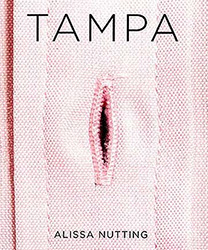 I’m not usually one for downloading books onto a Kindle as generally I seem to feel less sense of achievement. For one book I read over the summer however, I made an exception. I downloaded it onto my Kindle, partially due to the front cover, partially because I was scared that someone may recognise the title and assume I was some sort of pervert.Intrigued by its daring topic, I purchased Tampa by Alissa Nutting despite reading a few bad reviews online. The book follows Celeste Price, an English teacher from Florida who abuses her position to select and groom fourteen year old boys to seduce and have sex with. The most interesting thing about the book is most definitely the questions it raises about the perception and portrayal of female paedophiles. My reading choice was often met with shocked responses of ‘But how can she be a paedophile? It’s not the same is it?’ These comments made the book more interesting to me and although the book may not be a great piece of literature, it’s connected to something much more socially fascinating. When Val McDermid released The Mermaid’s Singing in 1995, the book was a direct response to the anxieties surrounding a female serial killer. Specifically, McDermid created the character based on Rose West, a character to challenge the conventional view of serial killers. This hasn’t really been done much for paedophiles, and certainly not for female paedophiles, so in a way, Nutting is doing something really important.The book is horrifically detailed, and at times the sheer volume of sex involved actually makes you start to question whether even paedophiles have such demanding libidos.
I’m not usually one for downloading books onto a Kindle as generally I seem to feel less sense of achievement. For one book I read over the summer however, I made an exception. I downloaded it onto my Kindle, partially due to the front cover, partially because I was scared that someone may recognise the title and assume I was some sort of pervert.Intrigued by its daring topic, I purchased Tampa by Alissa Nutting despite reading a few bad reviews online. The book follows Celeste Price, an English teacher from Florida who abuses her position to select and groom fourteen year old boys to seduce and have sex with. The most interesting thing about the book is most definitely the questions it raises about the perception and portrayal of female paedophiles. My reading choice was often met with shocked responses of ‘But how can she be a paedophile? It’s not the same is it?’ These comments made the book more interesting to me and although the book may not be a great piece of literature, it’s connected to something much more socially fascinating. When Val McDermid released The Mermaid’s Singing in 1995, the book was a direct response to the anxieties surrounding a female serial killer. Specifically, McDermid created the character based on Rose West, a character to challenge the conventional view of serial killers. This hasn’t really been done much for paedophiles, and certainly not for female paedophiles, so in a way, Nutting is doing something really important.The book is horrifically detailed, and at times the sheer volume of sex involved actually makes you start to question whether even paedophiles have such demanding libidos.
The book naturally ends in tragedy with two boys, a court case and a mortified husband.Celeste manages to persuade a jury that she isn’t a threat to young boys with the help of her Billy Flynn lawyer, and goes off to live a peaceful life on the beach. The book ends with Celeste continuing to prey on younger boys in her new setting, concluding that when she loses her looks, she will most likely have to pay for prostitutes until the day she dies. I was impressed with the boldness of the topic, and quite frankly, any book that sparks so many interesting conversations is worth a read.
Cath Barton
Instructions for a Heatwave
by Maggie O’Farrell
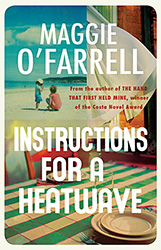 I had been saving up Maggie O’Farrell’s most recent novel for summer reading, and consumed it in a gobble over two days. When I read in the blurbs that a book is ‘unputdownable’ I usually think that is hyperbole. In this case it was (nearly) literally true for me.
I had been saving up Maggie O’Farrell’s most recent novel for summer reading, and consumed it in a gobble over two days. When I read in the blurbs that a book is ‘unputdownable’ I usually think that is hyperbole. In this case it was (nearly) literally true for me.
I love Maggie O’Farrell’s fiction for its emotional honesty. I chose The Vanishing Act of Esme Lennox as a book to give out on World Book Night last year for that reason. As a book to convert people to the pleasures of reading I would similarly recommend Instructions for a Heatwave. Set in that blistering summer of 1976 when we were all exhorted to share a bath, it shows us members of a family forced to confront the realities of their relationships with one another because of the father’s mysterious disappearance. Like all the novels I like best it plunged me into the world of this family, and left me scrolling out the continuation of their lives in my mind for days after I’d finished reading the book.
Maggie O’Farrell writes beautifully, sharing something of the poetic with Owen Sheers and something of the pellucid with Jon McGregor. She says of the heatwave that it makes people
…start behaving not unusually but unguardedly. They act not so much out of character as deep within it.
The family are Irish, and one of them is called Aoife, a name which many people (including me until I read this book) have no idea how to pronounce. An intriguing choice of name, for Aoife herself has problems with the written word:
…that makes a mess and a tangle, like string, inside her head.
Maggie O’Farrell makes a fascinating story within the story about this issue.
Many books disappoint me with their endings. This one does not. It has a sweet ending, or rather, beginning to what will come next, which is for the reader to imagine.
Carl Griffin
How to get Filthy Rich in Rising Asia
by Moshin Hamid
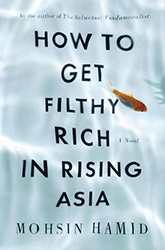 From the author of The Reluctant Fundamentalist comes a tale of personal betterment which is emotional, uplifting and triumphantly inventive all at once. From rural impoverishment to a sprawling metropolis, the unnamed protagonist gets the luck of being the third born and gets the life his older siblings did not receive. The reader is woven into the story through a second-person narrative, starting with a ride on the roof of a jam-packed bus and the discovery of streetlights and shop signs, then buildings evolving like the line of ape to man, turning from mud to brick to concrete.
From the author of The Reluctant Fundamentalist comes a tale of personal betterment which is emotional, uplifting and triumphantly inventive all at once. From rural impoverishment to a sprawling metropolis, the unnamed protagonist gets the luck of being the third born and gets the life his older siblings did not receive. The reader is woven into the story through a second-person narrative, starting with a ride on the roof of a jam-packed bus and the discovery of streetlights and shop signs, then buildings evolving like the line of ape to man, turning from mud to brick to concrete.
Upon arriving at this metropolis, where his father works as a cook, the boy takes the first step towards success with an education. In a school wedged between a tyre-repair stall and a corner kiosk mainly selling cigarettes, he shows more brains than the teacher. Then comes a side-job selling pirated DVDs, then a love interest.
The hero’s road to riches comes at us one chapter, one piece of advice, at a time. The pace though is fast and furious, and the unnamed hero is much more than a character the reader can pretend to be. Despite the constant use of ‘you’ by the narrator, the hero has bags of personality and is unforgettable, not through the use of description but through the settings, the scenarios, and his reaction to them. This style of writing might take a few chapters to warm to, but Mohsin Hamid proves a master storyteller.
Grow old with this character in a startling fictional self-help book, and complete its objective by getting filthy rich with him in rising Asia.
Jon Gower
Terra Nostra
by Carlos Fuentes
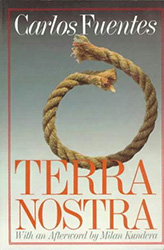 There were two big reading events this summer: the first was finally finding out what all the fuss was about by reading James Salter’s novels. He is quite simply a great American novelist who seems to have been at the top of his game for as long as he’s been playing, while being sorely neglected. I can’t begin to explain the effect of his beautiful and measured prose, where every sentence, every phrase, every single breath counts.
There were two big reading events this summer: the first was finally finding out what all the fuss was about by reading James Salter’s novels. He is quite simply a great American novelist who seems to have been at the top of his game for as long as he’s been playing, while being sorely neglected. I can’t begin to explain the effect of his beautiful and measured prose, where every sentence, every phrase, every single breath counts.
The other was big in terms of scale, ambition and execution. The great, late Carlos Fuentes’ Terra Nostra is what you’d have to describe as a doorstop of a novel, that is if the door you had in mind was the one thwarting invaders at the main keep of Caerffili castle. A hefty 788 page tome it concertinas nothing less than the entire history and relationship of Spain and South America, not to mention much of the Spanish literature that preceded it. Its historical scope alone doesn’t begin to explain the mesmerizing power of the novel, with its incantatory prose, full of elaborate repetitions, complex games, shape shifting and, well, fun.
Rather one has to admire, a trifle breathlessly, the sheer creative chutzpah of this grandee of Latin American letters in allowing the eighty-strong cast list of characters to be entirely interchangeable, thus creating a sort of mirage of history rather than holding up a mirror to it. It is also a profound experiment in form, creating a new model for the novel itself, or in Milan Kundera’s words, it is ‘the spreading out of the novel, the exploration of its possibilities, the voyage to the edge of what only a novelist can see and say.’
Terra Nostra is not an easy read, requiring an uncommon absorption on the part of the reader in its chimeric progress, but it reaps many rich and complicated rewards. As Jorge Volpi writes in his introduction, ‘Fuentes did not intend to write a novel, but rather all novels.’ True. It does feel like a whole library processed so that it fits between two covers. It is a novel thick with allusion, marvellously complex in its structure and, courtesy of its enormous panorama, a book which manages to meld historical epic with modern apocalypse at one and the same time, while also pulling off the trick of seemingly dissolving time, that on which all other novels must depend. In that, Fuentes has proved his towering, lasting power. It took me a fortnight to read.It will take a few years to absorb. All hail, Carlos. A master, truly.
Steph Power
Entertaining Strangers
by Jonathan Taylor
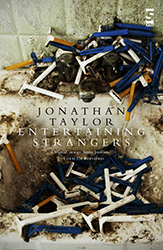 What first drew me to Entertaining Strangers was a review note on the back cover suggesting that the novel was a) funny and b) traversed a multitude of topics including ‘landladies, eccentrics, philosophers, bad families, music, degenerates, and ants.’ All of which I have had, as they say, ‘things to do with’ in some way. As it turns out, the plot is as surreal as this list suggests, and the book is funny – but it is also dark and tragic, with glimpses of horror and a narrative that is curiously compelling, given that lengthy passages are given over to the central character’s descriptions of ant behaviour.
What first drew me to Entertaining Strangers was a review note on the back cover suggesting that the novel was a) funny and b) traversed a multitude of topics including ‘landladies, eccentrics, philosophers, bad families, music, degenerates, and ants.’ All of which I have had, as they say, ‘things to do with’ in some way. As it turns out, the plot is as surreal as this list suggests, and the book is funny – but it is also dark and tragic, with glimpses of horror and a narrative that is curiously compelling, given that lengthy passages are given over to the central character’s descriptions of ant behaviour.
Ants are just one of Edwin Prince’s obsessions though, along with (much more to my taste) the music of Krysztof Penderecki and a searching for wider answers in the mutability of consonance and dissonance. There is rhyme here, and reason too of a kind, as we gradually discover through the book’s narrator, Jules; a homeless man who literally falls into Edwin’s (even more) wayward life after ‘I’d sat down for a minute on a dog-piss-soaked doorstep in a dog-piss street in a dog-piss town, when the door I was leaning against gave behind me.’ Not quite Alice down the rabbit-hole – but echoes of that within a colder, meaner cityscape.
However, there is warmth in the book too; not least because Jules comes to care for Edwin despite his melodramatic ways and defensive arrogance, and tries to help him repair his life against the odds; a thankless task which entails learning to look the mirror in the eye. Indeed, Taylor’s novel contains many touching, and often blackly comic, vignettes, set against a deeper, shadowing history of the terrible ethnic cleansing of the Armenians by the Ottomans, which slowly emerges through analogies of music and of madness. It is also well written and bravely ambitious, with an unforced, sincere compassion and many fine passages of no little anger which settle in unexpected corners of the mind.
Ben Glover
All The President’s Men
by Carl Bernstein and Bob Woodward
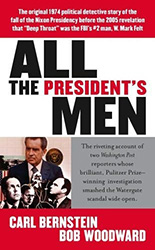 In my lifetime Richard Milhous Nixon has never been an easy character to understand. Often portrayed in the media as a dastardly comic villain akin to a monomaniacal used car salesman, Nixon’s legacy has been somewhat confused and distorted by these satirical revisions. But beneath these humorous caricatures is a man that had paranoia and inconceivable power in equal measures. A man that was willing to commit treason to gain power and destroy all opponents that challenged his authority. So the prospect of a light and breezy summer read was all but forgotten when I picked up All The President’s Men and entered the anaemically beige world of political corruption with Carl Bernstein and Bob Woodward.
In my lifetime Richard Milhous Nixon has never been an easy character to understand. Often portrayed in the media as a dastardly comic villain akin to a monomaniacal used car salesman, Nixon’s legacy has been somewhat confused and distorted by these satirical revisions. But beneath these humorous caricatures is a man that had paranoia and inconceivable power in equal measures. A man that was willing to commit treason to gain power and destroy all opponents that challenged his authority. So the prospect of a light and breezy summer read was all but forgotten when I picked up All The President’s Men and entered the anaemically beige world of political corruption with Carl Bernstein and Bob Woodward.
The story of two Washington Post reporters, on the trail of a criminal conspiracy that would eventually lead to the resignation of the President of the United States of America, has often been held up as the greatest triumph of investigative journalism. Fake Sheikhs and tapped phones it ain’t. But this book is a single-handed justification for the fourth estate and the freedom of the press. From the initial bungled break-in at the Democratic National Committee Headquarters at the Watergate office complex through to the charging of Nixon’s closest advisers; this is a tale that is familiar to many people, even those with only a passing interest in the machinations of the woefully (and possibly wonderfully) bloated American political system. It is precisely because of the infamy of these events which allows the reader time to ponder and indulge in the intricacies of political conspiracy. Rather than keeping up with the formulaic and hurried plot of the latest airport ‘novel’, the dark paranoia that permeates through every page of All The President’s Men develops a detailed narrative that is both captivating and enthralling. Here, it is the journey that is important – the destination is a mere afterthought.
The ultimate twist of All The President’s Men comes with the realisation that many of the ‘dirty tricks’ that Richard Nixon, and his Administration, employed to win elections and discredit opponents are now the accepted norm in current US presidential campaigns. There are many surprising discoveries in this book and some people of true character and integrity stand out (including Ben Bradlee, Executive Editor of The Washington Post, who risked his reputation [both personal and professional] and the future of his venerated publication to expose corruption at the highest levels of government), but perhaps the most shocking revelation was that I had never read this book before. And that truly astounds me.
Denise Rogers
‘The 24-Hour Dog’
By Jeanette Winterson
I have a hiccoughing mind that makes it easier to start a book than to finish one. The more interesting and engaging the book, the less likely I am to finish it without starting several others along the way. So I was very pleased to come across Ali Smith’s satisfyingly eclectic anthology, The Reader, this summer. My version has a grey dust jacket that feels and looks lovely and lists the contributors on the front, writers as diverse as Jane Austin, Billie Holiday, John Berger and Louise Brooks. I do tend to judge books by their covers, I’m afraid.
My favourite inclusion is a short story by Jeanette Winterson called ‘The 24-Hour Dog’. The story covers the narrator’s preparations for picking up a lurcher puppy and their first day and night together. During this time she decides she cannot cope with the dog because he sees her as she is: ‘He’s only a dog. Yes but he has found me out’.
The writer Sarah Schulman described ‘The 24-Hour Dog’ as ‘a story so dull and meaningless that the most interesting thing in it is when we learn that Jeanette owns a sports car with blue leather seats.’ Thankfully, meaning is in the mind of the beholder. This story includes so many of my favourite things; dogs, humour, anthropology, poetic language and disapproving cats. Jeanette Winterson writes dogs really well; the puppy is soft as rainwater; his head is like a question mark; he is trusting, vulnerable, love without caution; he jumps for joy, ‘the way creatures do, and children do and adults don’t do, and spend their lives wondering where the leap went’. She does not anthropomorphize. He is nervous because he has no idea whether the gravel drive he is standing on will move suddenly, like the car he has just experienced for the first time. And yet when she speaks to him he ‘[catches] the word as deftly as if I had thrown it’.
This is a story about the human need to create meaning through culture, from the Sistine Chapel to table manners. And about the struggle some of us encounter in trying to walk the narrow path between freedom and belonging. The narrator of this short story (who I suspect is Jeanette Winterson herself) confesses, ‘I have sometimes sacrificed freedom in order to belong, but more often I have given up all hope of belonging’. I would imagine that anyone touched by this sentence, dog lover or not, will take something from the story.
Bergman on Bergman: Interviews with Ingmar Bergman
by Stig Bjorkman, Torsten Manns and Jonas Sima
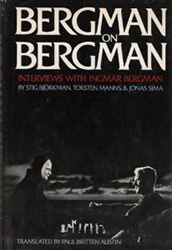 There was a time, about eight years ago, when I was more or less obsessed with Ingmar Bergman. My long suffering partner would have prepared a nice meal, perhaps, while I myself would have been to HMV to buy a suitable DVD to watch afterwards. Winter Light, my love? Through a Glass Darkly? Okay, how about Autumn Sonata, then? Ingrid Bergman’s in it so it can’t be depressing.
There was a time, about eight years ago, when I was more or less obsessed with Ingmar Bergman. My long suffering partner would have prepared a nice meal, perhaps, while I myself would have been to HMV to buy a suitable DVD to watch afterwards. Winter Light, my love? Through a Glass Darkly? Okay, how about Autumn Sonata, then? Ingrid Bergman’s in it so it can’t be depressing.
Uh oh. Two psychologically draining hours later it would be fair to say that from my partner’s point of view the romantic tenor of the evening had been, to say the least, somewhat decimated, something which would completely go over my head – partly because I was a very intense young person at that time and partly because I was also pathologically stupid.
However, as time wore on, perhaps because it occurred to me that our relationship was more important than Ingmar Bergman and perhaps because I started to find the things that he was saying less startling and more prosaic, I drifted away from dear old Ingmar, with the thought that, yes, Wild Strawberries, Persona, Fanny and Alexander, The Seventh Seal and Cries and Whispers were some of the greatest films ever made but that a lot of his other films were simply saying the same things less well and that, really, he was relentlessly miserable, wasn’t he?
Well, I am happy to say my partner and I are still together but unfortunately for her, Ingmar, in the shape of the classic book of interviews Bergman on Bergman is very much back. Out of print in English since 1993, it was a book which I very much wanted during my Bergman-obsessive years but could only find for eyebrow-risingly-high-prices. So, when I spied it in an Oxfam Bookshop I bought it more out of respect to my younger self than out of any particular desire to read it.
Indeed considering one of the other things which had extinguished my former Bergman-lust had been the Faber and Faber volume: Face to Face: Interviews with Ingmar Bergman, I wasn’t even particularly interested in reading it. But how wrong I was because Bergman on Bergman is every inch what that volume is not. It is very much the real deal. A series of interviews conducted in1968 by the three editors of Swedish film bible Chaplin, it is a book which must rank alongside works such as Dennis O’Driscoll’s collection of interviews with Seamus Heaney, Stepping Stones, such is the level of penetrating insight into Bergman’s craft and motivations. Because of who the interviewers are they ask just the right questions – and that includes ones you want to ask and ones you haven’t thought of – and because of who the interviewers are, Bergman is at ease. Not ratty and reserved as he can be in other interviews but engaged and amusing, palpably keen to make himself understood (or at least to make himself understood in the areas in which he would like to make himself understood.) And there are some wonderful slices of gossip and insight about other artists too, such as his response to Godard’s description of him as a practitioner of ‘cinema’ as ‘art’ and not ‘teamwork’, who ‘is always alone; on the set as before the blank page’:
I find Godard’s way of putting things bewitching. It’s precisely what he does himself, what he has fallen victim too! He is writing about himself. You must never forget that I have lived my life in the theatre; and theatre… is always a collective.
It really is a travesty that this book is out of print. You can buy the odd second hand copy online and really I would recommend that you do. In the meantime, I’m off to dig out that old DVD of Autumn Sonata.
Banner illustration by Dean Lewis












